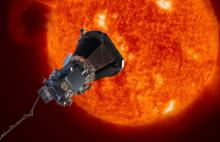Parker Solar Probe
NASA: Parker Solar Probe spacecraft gets closer to the Sun than ever before
The Parker Solar Probe spacecraft got closer than ever to the Sun to study its atmosphere.
The US space agency’s (NASA) unmanned spacecraft began a seven-year mission in August 2018 to uncover the secrets of the Sun – for example, solar storms that impact our communications.
The Solar Orbiter captured the sun’s surface – Watch the video
The Solar Orbiter mission photographed the Sun, leading the European Space Agency (ESA) to release, for the first time, high-resolution images of the star’s surface.
In Armageddon mission, Nasa to crash $330m spacecraft into asteroid to alter its course
The half-tonne probe will be travelling at more than four miles a second
Solar Orbiter blasts off to capture first look at sun's poles
Europe and NASA's Solar Orbiter rocketed into space on Feb. 9 night on an unprecedented mission to capture the first pictures of the sun's elusive poles.
"We're on the way to the sun. Go Solar Orbiter!" said Cesar Garcia Marirrodriga, project manager for the European Space Agency. "It's a fantastic moment ... it's like, well, we're unstoppable."
Scientists Over the Moon for NASA's Solar Probe Launch to the Sun
CAPE CANAVERAL, Fla. — Speechless is not a word typically used to describe Nicky Fox, mission scientist for the Parker Solar Probe at the Johns Hopkins Applied Physics Lab. But that was her reaction in the wee hours today (Aug. 12) as she watched NASA's Parker Solar Probe launch on an unprecedented mission to the sun.
New York Post: Bulgarian Mystic who 'Predicted' ISIS, 9/11 had Two Prophecies for 2018
A blind mystic who many claim predicted 9/11, the rise of ISIS, the Boxing Day tsumani and Brexit also foresaw two major events in 2018.
Bulgarian Baba Vanga — who died in 1996 at the age of 85 — is well known among conspiracy theorists who believe she foretold natural disasters and global events long before they occurred.
NASA Planning First Mission to Directly Probe the Sun
The Parker Solar Probe Auto Station will head to the Sun in the summer of 2018 to study the flow of particles coming from the star, better known as solar eruptions.




